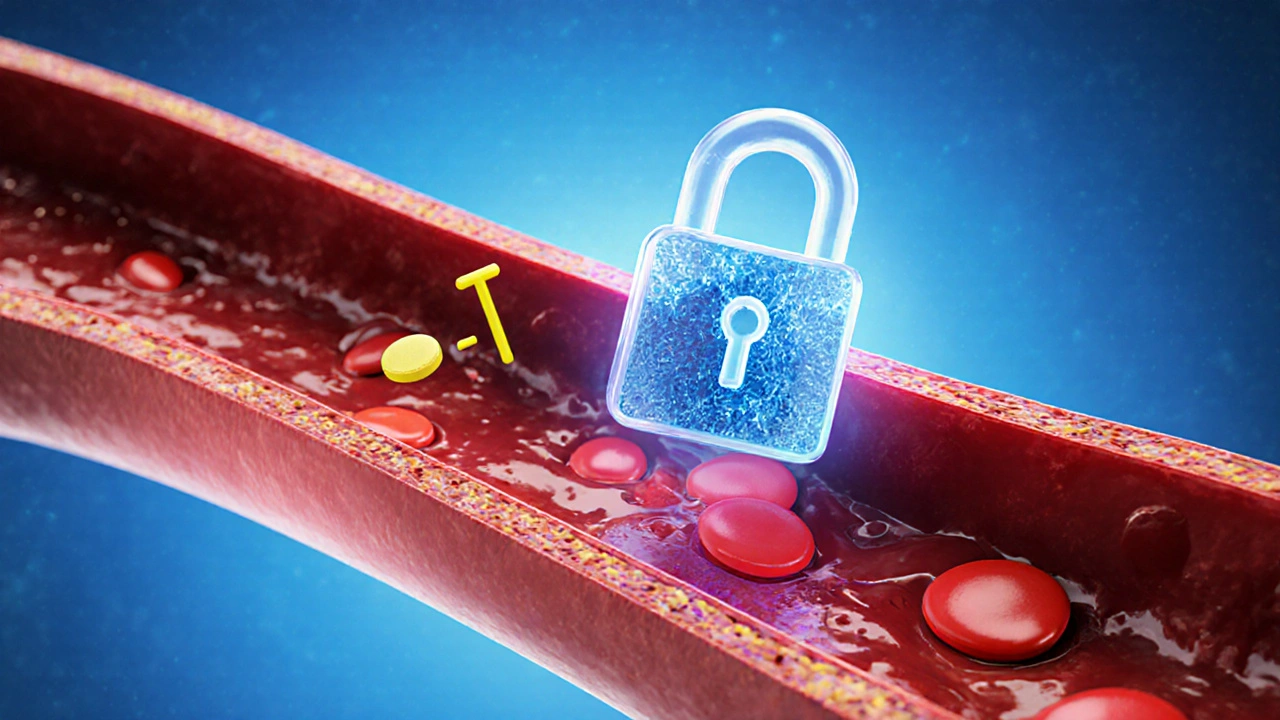Ecosprin vs. Pain Relief Alternatives Comparison Tool
Recommended Options Based on Your Needs
Best for heart protection and long-term clot prevention. Cost-effective and widely available.
- Antiplatelet effect
- Moderate GI risk
- AU$0.30 per tablet
Gentle on stomach, excellent for headaches and fever. No antiplatelet effect.
- No GI irritation
- Low bleeding risk
- AU$0.15 per tablet
Stronger pain and inflammation relief. Higher GI risk; take with food.
- High anti-inflammatory
- High GI risk
- AU$0.20 per tablet
Prescription alternative for those intolerant to aspirin. Higher cost but fewer stomach issues.
- Alternative antiplatelet
- Lower GI risk
- AU$1.00 per tablet
- Ecosprin’s 75mg chewable is designed for long-term heart protection, not acute pain.
- Always consult a healthcare provider for persistent conditions or concerns.
- Combine medications only under medical supervision to avoid interactions.
When you reach for a pain reliever, Ecosprin is a branded form of acetylsalicylic acid (ASA) that’s been marketed in Australia since the 1970s. It’s sold in 75mg chewable tablets and 150mg regular tablets, mainly for heart‑related prevention and mild‑to‑moderate pain. But is it truly the top pick compared with other over‑the‑counter and prescription options?
Quick Takeaways
- Ecosprin is essentially aspirin, but its chewable 75mg dose is aimed at antiplatelet therapy.
- Ibuprofen and naproxen are stronger pain killers but carry higher gastrointestinal (GI) risk.
- Paracetamol is gentle on the stomach yet lacks antiplatelet effects.
- Clopidogrel is a prescription antiplatelet that works differently and is used when aspirin isn’t tolerated.
- Cost, dosing convenience, and side‑effect profile decide which option fits you best.
What is Ecosprin?
Ecosprin contains 75mg or 150mg of acetylsalicylic acid per tablet. The lower‑dose chewable form is registered for secondary prevention of cardiovascular events-think heart attacks and strokes-while the higher‑dose tablets are labeled for pain relief. Because the 75mg dose is sub‑therapeutic for pain, many doctors prescribe it solely for its antiplatelet action.
How does aspirin work?
Aspirin (generic name acetylsalicylic acid) is an NSAID that reduces pain, fever, and platelet aggregation. It irreversibly blocks the enzyme cyclooxygenase‑1 (COX‑1), which stops the production of thromboxaneA₂-a molecule that tells platelets to clump together. The result is a thinner blood, which lowers the chance of clots forming in arteries.

Common alternatives
Below are the most frequently considered substitutes, each with its own strengths and drawbacks.
Ibuprofen is a non‑selective NSAID that provides stronger analgesic and anti‑inflammatory effects than low‑dose aspirin.
Paracetamol (acetaminophen) works mainly in the brain to reduce pain and fever, without significant anti‑platelet activity.
Naproxen offers a longer half‑life than ibuprofen, making it convenient for chronic pain, but it also irritates the stomach lining.
Clopidogrel is a prescription antiplatelet that blocks a different pathway (P2Y12 receptor) and is used when patients cannot tolerate aspirin.
Acetylsalicylic acid is the chemical name for aspirin; the term helps differentiate the pure compound from brand‑name products.
Proton‑pump inhibitor (e.g., omeprazole) reduces stomach acid and helps protect the lining when NSAIDs are used.
Side‑effect snapshot
- GI irritation or ulcer: higher with ibuprofen and naproxen; moderate with aspirin; low with paracetamol.
- Bleeding risk: aspirin and clopidogrel increase bleeding time; ibuprofen and naproxen do too but less predictably.
- Kidney impact: ibuprofen and naproxen can reduce renal blood flow, especially in dehydrated users.
- Allergic reactions: more common with aspirin‑sensitive asthma; ibuprofen can trigger similar reactions.
Comparison table
| Drug | Type | Typical dose | Main use | GI risk | Bleeding risk | Approx. cost (AU$) |
|---|---|---|---|---|---|---|
| Ecosprin | ASA (brand) | 75mg chewable / 150mg tablet | Antiplatelet / mild pain | Moderate | Moderate | 0.30 per tablet |
| Aspirin (generic) | ASA | 75‑325mg | Pain, fever, antiplatelet | Moderate | Moderate | 0.12 per tablet |
| Ibuprofen | NSAID | 200‑400mg q6‑8h | Pain, inflammation | High | Low‑moderate | 0.20 per tablet |
| Paracetamol | Analgesic/Antipyretic | 500‑1000mg q4‑6h | Pain, fever | Low | Low | 0.15 per tablet |
| Naproxen | NSAID | 250‑500mg bid | Chronic pain, arthritis | High | Low‑moderate | 0.25 per tablet |
| Clopidogrel | Prescription antiplatelet | 75mg daily | Post‑PCI, aspirin‑intolerant | Low‑moderate | High | 1.00 per tablet |

Choosing the right option for you
If your primary goal is cardiovascular protection, the 75mg chewable Ecosprin remains a solid, low‑cost choice-provided you don’t have a history of stomach ulcers. For occasional headaches, paracetamol is gentler on the gut and costs about the same.
When you need strong anti‑inflammatory action (e.g., sports injury), ibuprofen or naproxen will work faster, but you should take them with food or a proton‑pump inhibitor to shield the lining.
Patients who develop aspirin‑induced asthma or recurrent GI bleeding often switch to clopidogrel under a doctor’s supervision. It’s pricier, but it bypasses the COX‑1 pathway entirely.
Safety tips and drug interactions
- Never combine two NSAIDs (e.g., aspirin + ibuprofen) unless a doctor says so; the overlap raises bleeding and ulcer risk.
- Alcohol amplifies GI irritation for all aspirin‑type drugs.
- Blood thinners such as warfarin or direct oral anticoagulants (DOACs) stack with aspirin’s bleeding effect-monitor INR closely.
- Kids and teenagers with viral infections should avoid aspirin to prevent Reye’s syndrome.
- Check kidney function before using ibuprofen or naproxen if you have hypertension or diabetes.
Frequently Asked Questions
Can I take Ecosprin for a regular headache?
Ecosprin’s 150mg tablet can relieve mild‑to‑moderate pain, but its 75mg chewable form is intended for heart protection. For occasional headaches, paracetamol or a standard 300mg aspirin tablet is usually more cost‑effective.
Is the chewable 75mg dose enough to stop a heart attack?
The 75mg dose doesn’t treat an ongoing heart attack; it helps prevent clots from forming long‑term. If you suspect a heart attack, call emergency services immediately.
What should I do if I experience stomach pain after taking Ecosprin?
Stop the medication and talk to a pharmacist or doctor. They may advise an antacid, a proton‑pump inhibitor, or switching to a different antiplatelet like clopidogrel.
Can I take ibuprofen together with Ecosprin?
Generally not recommended because both affect platelet function and increase bleeding risk. If a short‑term combo is needed, a healthcare professional should supervise.
Is there a generic version of Ecosprin I can buy?
Yes-plain aspirin tablets (75mg or 150mg) are the generic equivalent and are usually cheaper. However, the chewable formulation is unique to Ecosprin.



Comments
Look, the pharma giants don’t want you to know that aspirin was cheap for a reason – they push brand names like Ecosprin to make a profit while hiding the fact that plain aspirin works just as well. The 75 mg chewable is just a marketing gimmick, and the “chewable” claim is a way to get doctors to prescribe a brand they get a kickback on.
Hey everyone 😊 this comparison is super helpful I’m really glad you posted it it breaks down the options in a friendly way and makes it easy to choose especially if you’re new to meds 😊 remember that Ibuprofen can be tough on the stomach so taking it with food is smart and don’t forget that even cheap aspirin can save a life if you need heart protection 😊 keep an eye on the cost too because a few cents per tablet add up over months 😊 stay safe and happy healing
Great rundown! I especially appreciate the clear note about the chewable 75 mg being for heart protection rather than quick pain relief. It’s easy to get confused, and this guide keeps things simple. 👍
Exactly, the distinction can be tricky for many, and the table does a solid job highlighting that. It’s good to have that clarified.
Choosing a pill is a micro‑decision echoing our larger balance between cost, comfort, and long‑term health.
Just a heads‑up – the generik 75 mg aspirin is usually half the price of Ecosprin AU$0.12 vs AU$0.30 per tablet – so if you’re looking to save a buck, buy the plain version. Also, watch out for “chewable” labeling – some pharmacies may mix it up.
It’s a bit sad that people keep buying brand names when the generic works just as well – supporting big pharma over community health feels like a selfish choice.
Let’s get pumped! 💪 If you’re after serious inflammation relief, ibuprofen or naproxen are the champs – just remember food and maybe a PPI if your stomach’s sensitive. For heart protection, that cheap aspirin chewable does the job, no need to splurge. Keep moving, stay informed, and you’ll find the perfect match for your body!
While your enthusiasm is noted, the pharmacokinetic profiles of NSAIDs such as ibuprofen (Cmax ~2 h) versus naproxen (t½ ~12 h) dictate distinct dosing regimens – a nuance often glossed over in pop‑science posts.
Whoa!!!!!! Did you really think the pharma industry would …… just sit back!!!? Think again!!!!
Brand names are just marketing tricks.
Oh wow, never saw that coming – a brand is just a label, right? 🙄
Thanks for the solid info 😊 it really helps me decide which med fits my lifestyle. Keep the guides coming! 👍
In the theater of our bodies, each tablet is a character stepping onto the stage, bearing the weight of centuries of chemistry and commerce, and we, the audience, must decide which protagonist to crown.
The selection of an appropriate analgesic or antiplatelet agent is not merely a matter of price comparison, but rather an intricate assessment of pharmacodynamics, patient comorbidities, and lifestyle considerations. When evaluating Ecosprin’s 75 mg chewable formulation, one must first acknowledge its irreversible inhibition of COX‑1, which confers a consistent antiplatelet effect useful in secondary prevention of cardiovascular events. However, this same mechanism also predisposes the gastric mucosa to irritation, a risk that becomes clinically significant in patients with a history of peptic ulcer disease. In contrast, ibuprofen offers reversible COX inhibition, delivering potent anti‑inflammatory relief but at the expense of a higher incidence of gastrointestinal discomfort if taken without food. Paracetamol, while gentle on the stomach, operates primarily within the central nervous system, providing antipyretic and analgesic benefits without any antiplatelet activity, making it unsuitable for cardiovascular protection. Naproxen’s longer half‑life can be advantageous for chronic pain management, yet its sustained COX‑1 suppression magnifies the potential for ulcer formation. Clopidogrel, a thienopyridine, bypasses the COX pathway entirely, offering an alternative for aspirin‑intolerant patients, though its cost and requirement for prescription present barriers for some. The economic dimension, as reflected in the table, illustrates that generic aspirin per tablet can be as low as AU$0.12, a fraction of the cost of brand‑named options, and this disparity becomes magnified over long‑term therapy. Moreover, the concomitant use of proton‑pump inhibitors can mitigate gastrointestinal risks associated with NSAIDs, a strategy that should be individualized based on patient risk profiles. It is also imperative to consider drug‑drug interactions, particularly with anticoagulants such: warfarin or direct oral anticoagulants, where additive bleeding risk may become life‑threatening. Renal function assessments are essential before initiating ibuprofen or naproxen, especially in patients with hypertension or diabetes, due to their potential to diminish renal perfusion. Patient education on the correct dosing intervals-for example, ibuprofen every six to eight hours versus paracetamol every four to six hours-prevents inadvertent overdose. Ultimately, the clinician’s role is to synthesize these variables into a personalized recommendation that aligns with the patient’s clinical goals and socioeconomic context. By doing so, the therapeutic regimen can maximize efficacy while minimizing adverse effects, thereby improving overall health outcomes. In practice, a shared decision‑making conversation that incorporates these nuances will empower patients and foster adherence to the chosen therapy.
Sure, but most people just read the price and pick the cheapest, ignoring the whole pharmacology lecture.
It is incumbent upon healthcare professionals to furnish patients with a comprehensive elucidation of both the therapeutic advantages and potential iatrogenic hazards associated with each analgesic and antiplatelet agent. The aforementioned comparative analysis serves as an adjunctive instrument, yet it must be contextualized within individual clinical scenarios, including comorbid conditions, concomitant pharmacotherapy, and socioeconomic determinants. A judicious appraisal of gastrointestinal prophylaxis, renal function, and bleeding propensity is requisite prior to the initiation of any non‑steroidal anti‑inflammatory drug. Moreover, adherence to evidence‑based guidelines, such as those promulgated by cardiovascular societies, should inform the selection of antiplatelet therapy, reserving clopidogrel for aspirin‑intolerant cohorts. In sum, an interdisciplinary approach that integrates patient education, risk stratification, and cost considerations will optimize therapeutic outcomes.
Totally agree – the guide is a good start but real life needs the personal touch and budget hacks.
Let's cut the fluff – if you can't afford generic aspirin, stop paying for brand hype 😒
In the grand tapestry of medicine, each choice we make reverberates, echoing beyond the pharmacy counter.